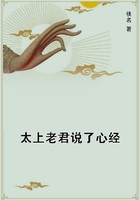What follows is clear enough. Zarathustra sees a young shepherd struggling on the ground with a snake holding fast to the back of his throat. The sage, assuming that the snake must have crawled into the young man's mouth while he lay sleeping, runs to his help and pulls at the loathsome reptile with all his might, but in vain. At last, in despair, Zarathustra appeals to the young man's will. Knowing full well what a ghastly operation he is recommending, he nevertheless cries, "Bite! Bite! Its head off! Bite!"as the only possible solution of the difficulty. The young shepherd bites, and far away he spits the snake's head, whereupon he rises, "No longer shepherd, no longer man--a transfigured being, a light-surrounded being, that LAUGHED! Never on earth laughed a man as he laughed!"In this parable the young shepherd is obviously the man of to-day; the snake that chokes him represents the stultifying and paralysing social values that threaten to shatter humanity, and the advice "Bite! Bite!" is but Nietzsche's exasperated cry to mankind to alter their values before it is too late.
Chapter XLVII. Involuntary Bliss.
This, like "The Wanderer", is one of the many introspective passages in the work, and is full of innuendos and hints as to the Nietzschean outlook on life.
Chapter XLVIII. Before Sunrise.
Here we have a record of Zarathustra's avowal of optimism, as also the important statement concerning "Chance" or "Accident" (verse 27). Those who are familiar with Nietzsche's philosophy will not require to be told what an important role his doctrine of chance plays in his teaching. The Giant Chance has hitherto played with the puppet "man,"--this is the fact he cannot contemplate with equanimity. Man shall now exploit chance, he says again and again, and make it fall on its knees before him! (See verse 33 in "On the Olive Mount", and verses 9-10 in "The Bedwarfing Virtue").
Chapter XLIX. The Bedwarfing Virtue.
This requires scarcely any comment. It is a satire on modern man and his belittling virtues. In verses 23 and 24 of the second part of the discourse we are reminded of Nietzsche's powerful indictment of the great of to-day, in the Antichrist (Aphorism 43):--"At present nobody has any longer the courage for separate rights, for rights of domination, for a feeling of reverence for himself and his equals,--FOR PATHOS OFDISTANCE...Our politics are MORBID from this want of courage!--The aristocracy of character has been undermined most craftily by the lie of the equality of souls; and if the belief in the 'privilege of the many,' makes revolutions and WILL CONTINUE TO MAKE them, it is Christianity, let us not doubt it, it is CHRISTIAN valuations, which translate every revolution merely into blood and crime!" (see also "Beyond Good and Evil", pages 120, 121). Nietzsche thought it was a bad sign of the times that even rulers have lost the courage of their positions, and that a man of Frederick the Great's power and distinguished gifts should have been able to say: "Ich bin der erste Diener des Staates" (I am the first servant of the State.) To this utterance of the great sovereign, verse 24 undoubtedly refers. "Cowardice" and "Mediocrity," are the names with which he labels modern notions of virtue and moderation.
In Part III., we get the sentiments of the discourse "In the Happy Isles", but perhaps in stronger terms. Once again we find Nietzsche thoroughly at ease, if not cheerful, as an atheist, and speaking with vertiginous daring of making chance go on its knees to him. In verse 20, Zarathustra makes yet another attempt at defining his entirely anti-anarchical attitude, and unless such passages have been completely overlooked or deliberately ignored hitherto by those who will persist in laying anarchy at his door, it is impossible to understand how he ever became associated with that foul political party.
The last verse introduces the expression, "THE GREAT NOONTIDE!" In the poem to be found at the end of "Beyond Good and Evil", we meet with the expression again, and we shall find it occurring time and again in Nietzsche's works. It will be found fully elucidated in the fifth part of "The Twilight of the Idols"; but for those who cannot refer to this book, it were well to point out that Nietzsche called the present period--our period--the noon of man's history. Dawn is behind us. The childhood of mankind is over. Now we KNOW; there is now no longer any excuse for mistakes which will tend to botch and disfigure the type man. "With respect to what is past," he says, "I have, like all discerning ones, great toleration, that is to say, GENEROUS self-control...But my feeling changes suddenly, and breaks out as soon as I enter the modern period, OUR period.
Our age KNOWS..." (See Note on Chapter LXX.).
Chapter LI. On Passing-by.
Here we find Nietzsche confronted with his extreme opposite, with him therefore for whom he is most frequently mistaken by the unwary.
"Zarathustra's ape" he is called in the discourse. He is one of those at whose hands Nietzsche had to suffer most during his life-time, and at whose hands his philosophy has suffered most since his death. In this respect it may seem a little trivial to speak of extremes meeting; but it is wonderfully apt. Many have adopted Nietzsche's mannerisms and word-coinages, who had nothing in common with him beyond the ideas and "business" they plagiarised; but the superficial observer and a large portion of the public, not knowing of these things,--not knowing perhaps that there are iconoclasts who destroy out of love and are therefore creators, and that there are others who destroy out of resentment and revengefulness and who are therefore revolutionists and anarchists,--are prone to confound the two, to the detriment of the nobler type.















